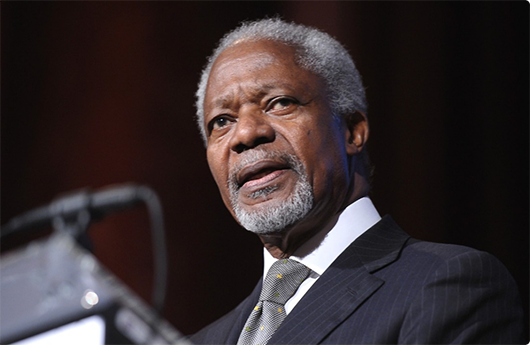
Kofi Annan
Former UN Secretary General
The continent can build on the progress of Ethiopia and Rwanda with low-carbon energy investments.
The December 2015 talks in Paris on a new global climate treaty are approaching fast.
At the same time, Africa is already experiencing earlier and more damaging impacts of climate change than many other parts of the world.
The urgency of climate threats calls for determined leadership.
Bold, proactive leadership is also required to harness effectively the opportunities now before us to transition to a low-carbon global economy.
Some countries in Africa, such as Ethiopia and Rwanda, are already emerging as global leaders in climate-resilient development.
Building on such progress, Africa could now play an instrumental role in promoting climate-smart energy options within the international arena.
First, however, Africa must act as one region.
In this year’s Africa Progress Report, Power, People, Planet: Seizing Africa’s Energy and Climate Opportunities, we stress the importance of Africa speaking with one voice.
Greater cohesion among African countries will be essential to success – in terms of the positions they take to Paris as well as in how they negotiate.
Engaged political leadership at the highest levels is also crucial.
Efforts underway to ensure such leadership – before, during and beyond the Paris talks – must be stepped up.
In recent years, the Common African Position developed by the African Group of Negotiators and endorsed by the African Ministerial Conference on the Environment have provided the basis for a strong set of demands that African countries can collectively push in global negotiations.
However, the sheer diversity of the continent and the different climate-related interests at play have often meant that in practice leading African countries have diverged from agreed common positions.
Such fragmentation should not happen when the future of the planet is at stake.
A coherent set of common African demands will be critical if the world is to raise the level of ambition needed for the Paris talks to end with a viable global climate agreement.
Africa’s leaders must push for ‘development first’ while emphasising that it is possible for Africa to expand its economies and improve the well-being of its citizens by choosing a low-carbon path.
A strong African voice promoting the opportunities for a ‘triple win’ in energy, climate action and poverty reduction can set the tempo for a scaling up of low-carbon energy investment, not just on the continent but globally.
The recent G7 pledge to increase investments in the African renewables sector is a powerful acknowledgement from some of the world’s major emitters of the important role Africa can play.
As we move towards Paris, all African countries must now act together for the future of the planet.























